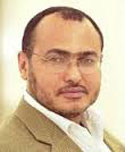
By Khaled Abou El Fadl
27 Jun 2016
One of the truly sublime Muslim voices that for decades had been chanting endless mystical devotionals communing with God has been silenced by the bullet of an assassin. Amjad Sabri of the Sabri Brothers has been killed, and his unfortunate companion injured, by radicals in Karachi, Pakistan.
A year earlier, a frivolous blasphemy case was filed against Sabri because radical Muslims did not like some of his Sufi lyrics about the Prophet and his family.
As has become the pattern and practice among extremists, they kill and destroy what they do not like - that is, everything that has as much as a scintilla of beauty, intellect, or mercy.
Every time such criminal elements that associate themselves with Islam commit a new act of murder and mayhem, millions of Muslims around the world mourn. Today is no exception.
Sufi Qawwali Music
For those who do not know, the Sufi Qawwali music of the Sabri Brothers is not a recent fad or a modern invention of Westernised Muslims.
The Qawwali music is a devotional mystical supplication that goes back seven centuries or more.
Invented and popular in South Asia, the Qawwali originated with the Chishti Sufi order which fused Persian, Arabic, Turkish, and Indian musical elements to create its own unique style of Sama' (listening to the sounds of divinity).
Qawwali itself derives from the word "Qawl" or the utterance of words. The significance of this is that like all forms of Sufi music, the Qawwali is premised on the theological centrality of listening to creation, and in return reverberating the ecstatic sounds of love, longing, and devotion to the Divine.
Typically, the Qawwali will sing the praises of God and the Prophet Muhammad and his family, lament separation and loss, or perform ghazals, which are supernal love songs couched in sometimes highly metaphorical and symbolic terms of intoxication and even hedonistic oblivion for the sake of the beloved.
Like so much of Sufi music, the Qawwali played a critical social role in transcending social, sectarian, and even religious divides.
In South Asian countries such as India, Pakistan, and Bangladesh, the Qawwali plays an unmistakably unifying and integrational role in bringing various classes, sects, and religious groups together over universal themes.
Bridging the Divide
In fact, well beyond South Asia, Sufi music - and especially the Sabri Brothers - have been bridging the divide between Islam and the West.
Like so much of Sufi music, the Qawwali played a critical social role in transcending social, sectarian, and even religious divides.
The Sabri Brothers performed in Carnegie Hall in as early as 1975, collaborated with Western artists and record labels, and performed in sold-out venues throughout Europe and the US.
Perhaps it is precisely the conciliatory and unifying role played by groups like the Sabri Brothers that make them so detestable to radical groups.
In truth, the Sabri Brothers and the other Sufi performers act as ambassadors of a very different Islam than that espoused by radical groups.
It is a far more tolerant, loving, and beautiful message than the typically divisive, intolerant, and bloody visions fantasised by the radicals.
For the radicals, Sufis with their Qawwalis, Ghazals, laments, and longings are nothing more than heretical unbelievers. Yet, the historical reality is that Sufi Islam is older and far more original to the tapestry of Islam.
Indeed, as recent scholarship has proven, up until the 17th century, it was not uncommon for Muslims to belong to Sufi orders.
In short, some argue that Sufism is more anchored in the lived historical reality of Muslims than many other theological interpretations.
Different Genres of Musical Composition
Sure, radical groups are quite adept at spewing out many pedantic arguments about why music is forbidden in Islam, but the fact remains that the view prohibiting all forms of music was an ignoble marginality until the mid-20th century.
The fact also remains that from the time of the Prophet to this very day, every Muslim society has produced many different genres of musical composition and performance.
When I learned of Sabri's murder, I could imagine the heavens crying for the beautiful hymns that have been silenced, and like millions of Muslims, I wished I could defy the murderous goons by uniting the entire world in a divine hymn against their ugliness.
The truth is that they, just like al-Qaeda, ISIL (also known as ISIS), Boko Haram, and of course their theological "teachers", methodically and systematically destroy everything beautiful in Islam. They target and destroy the artefacts and historical sites that defy their pedantic and false sense of history.
They even target the manuscripts that preserve the rich intellectual tradition of Islamic civilisation. Without conscience, they murder divinity itself when they kill human beings who are, regardless of faith or creed, nothing but bearers of the divinity of their Maker. These are the true radical extremists. They and only they are the true enemies of Islam.
Source: aljazeera.com/indepth/opinion/2016/06/pakistan-murdering-sabri-brothers-160626112306650.html




 Moderate Islamist here
Moderate Islamist here


0 comments:
Post a Comment